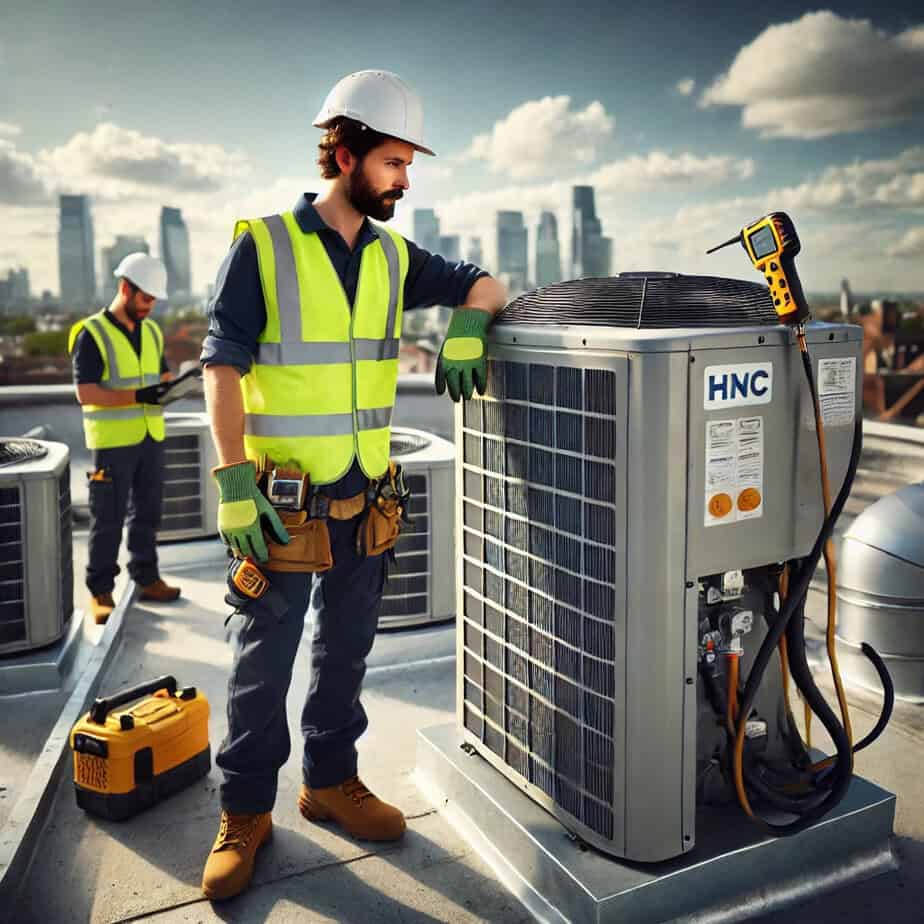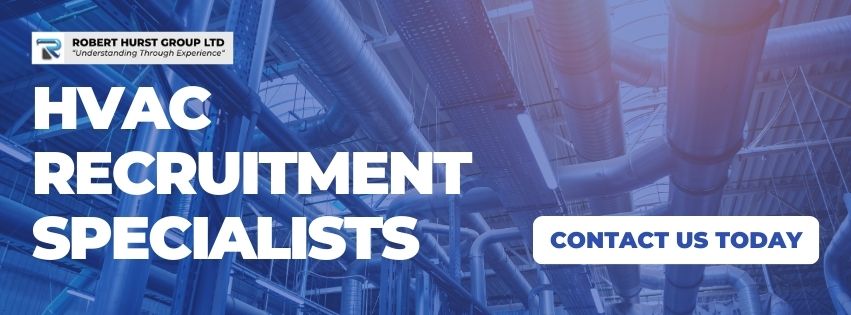In today’s ever-evolving construction and mechanical landscape, the demand for qualified HVAC maintenance engineers across the UK is at an all-time high. As infrastructure projects surge and energy efficiency regulations tighten, the need for consistent, skilled maintenance has never been more critical.
Yet, while the demand continues to rise, the availability of experienced HVAC professionals is struggling to keep pace. From regional skills gaps to fierce competition from other sectors, finding the right engineers is more challenging than ever.
In today’s market, HVAC Maintenance Engineer Recruitment in the UK requires more than just a job listing—it demands a strategy. For companies across the construction, mechanical, and electrical sectors, securing top talent can differentiate between project delays and project success.
This guide is designed to help you understand the landscape, recognise what to look for in candidates, and implement a hiring strategy that delivers results.

Understanding the Demand for HVAC Maintenance Engineers in the UK
The HVAC (Heating, Ventilation, and Air Conditioning) sector plays a critical role in the UK’s infrastructure. HVAC systems are fundamental for ensuring climate control in office buildings, maintaining safe data centre temperatures, and managing hospital air quality.
Rising demand across sectors
The UK’s commercial, industrial, and residential spaces are all undergoing upgrades to meet modern environmental standards. With the government pushing net-zero targets and energy-efficiency incentives, maintenance engineers are essential for ongoing servicing and compliance.
Beyond new builds, many older buildings are being retrofitted to meet modern building regulations, significantly increasing the need for regular maintenance of newly installed HVAC systems. This has created long-term opportunities for engineers with expertise in fault finding, efficiency optimisation, and safe system operation.
Compliance and energy efficiency
Maintenance isn’t just about function—it’s about following the rules. Engineers are now expected to have working knowledge of legislation such as F-Gas Regulation (EU) No 517/2014, which governs the use of fluorinated greenhouse gases in HVAC systems. Non-compliance can result in costly penalties.
With building owners increasingly audited for compliance and sustainability performance, hiring engineers with a strong awareness of British Standards (such as BS EN 378) and the ability to document servicing procedures accurately is critical. This mitigates risk and protects your business reputation in the long run.
Industry growth and the talent gap
According to the Building Engineering Services Association (BESA), the UK needs thousands of additional HVAC professionals to meet future demand. With a growing number of projects and an ageing workforce, this shortage will only widen unless businesses act fast.
The shift towards sustainable and renewable HVAC technologies such as air source heat pumps and low-carbon cooling systems is also creating a new skill demand. Engineers who understand traditional systems and green alternatives are increasingly sought after but are currently in short supply.
Acting proactively
Waiting until you’re short-staffed leads to rushed hiring, poor cultural fit, or compliance risks. Companies that get ahead build relationships with specialist recruiters and tap into talent pools early.
Proactive recruitment also helps build stronger teams with lower turnover rates. Businesses that continuously engage with candidates, even when not actively hiring, are better positioned to make fast, high-quality hires when needed.

Key Qualities to Look for in Top HVAC Maintenance Engineers
Finding the right HVAC engineer isn’t just about ticking qualifications off a list. You need professionals handling the job’s technical, regulatory, and interpersonal demands.
Qualifications and certifications
At a minimum, engineers should hold recognised qualifications such as:
- NVQ Level 2 or 3 in HVAC, Air Conditioning or Refrigeration
- F-Gas Category 1 Certification
- Additional certifications for working at height, asbestos awareness, or confined spaces are often beneficial.
These qualifications confirm that candidates have the foundational technical competence to perform essential tasks. Clients will often expect familiarity with manufacturer-specific training (Daikin, Mitsubishi, etc.), so engineers who can demonstrate up-to-date practical learning have a competitive edge.
Hands-on experience
Look for candidates who’ve worked with systems like:
- VRV/VRF (Variable Refrigerant Volume/Flow)
- Chillers and split systems
- Boilers, AHUs (Air Handling Units), and BMS (Building Management Systems)
Experience with diverse building types—such as hospitals, airports, or retail centres—can also be a key indicator of adaptability. Engineers who understand different building pressures, ventilation zones, and maintenance schedules are typically more effective on-site.
Soft skills matter
- Problem-solving: Can they resolve breakdowns quickly under pressure?
- Communication: Are they clear with clients and internal teams?
- Reliability: Are they punctual, prepared, and safe on-site?
These soft skills contribute significantly to client satisfaction. For example, engineers who communicate issues clearly and respectfully are more likely to maintain long-term service contracts and positive client relationships, which is crucial for companies relying on repeat business.
Health & safety awareness
A strong understanding of UK safety practices (RAMS, COSHH, PPE compliance) is essential—especially on active construction sites or high-risk environments.
Candidates with up-to-date health and safety accreditations (such as CSCS cards or IOSH training) demonstrate a proactive approach to risk management. This reduces the likelihood of on-site incidents and ensures insurance and legal requirements compliance.

Common Recruitment Challenges and How to Overcome Them
Despite a growing pool of roles, attracting and hiring qualified engineers remains difficult.
1. Regional skills shortages
Some areas, particularly outside major cities, lack locally based talent. Engineers may be unwilling to travel long distances or relocate, making roles harder to fill.
To mitigate this, companies can offer location-based travel allowances, accommodation options, or flexible working hours to make regional positions more appealing. A local talent mapping exercise—often provided by specialist agencies—can also reveal untapped pockets of talent.
2. Competition from other industries
Engineers with HVAC skills are in high demand across sectors like manufacturing, renewable energy, and facilities management. These industries may offer higher salaries or different work-life balance perks.
To remain competitive, it’s vital to understand what engineers value beyond salary—such as training opportunities, consistent work schedules, and job stability. Offering attractive non-financial benefits can tip the scales in your favour.
3. Delayed hiring processes
Many companies lose top candidates because of slow internal decision-making or poorly defined job roles.
Speed is critical in today’s market. Transparent internal sign-off processes and predefined interview timelines can dramatically improve your chances of securing top talent before they accept competing offers.
How to overcome it:
- Work with a specialist recruiter who understands the market and has access to active and passive candidates.
- Use pre-screened talent pools to speed up placement times.
- Develop a clear hiring brief and offer competitive packages to avoid losing talent to competitors.
Collaborating with agencies specialising in HVAC Maintenance Engineer Recruitment UK gives your business access to candidates already vetted for skill, availability, and compliance—saving time and resources.

Why Partnering with a Specialist Recruitment Agency Like Robert Hurst Group Ltd. Makes a Difference
When hiring for highly technical roles, experience matters—both in the candidates and the recruitment process itself.
Industry expertise that works for you
At Robert Hurst Group Ltd., we specialise in recruitment across the construction, mechanical, and electrical sectors. We understand the qualifications, standards, and expectations specific to HVAC roles.
We’re not generalists—we’re industry-focused. That means we can speak your language, vet candidates against job-specific criteria, and deliver results quickly and precisely. Our recruiters also keep up with evolving industry standards to ensure you remain compliant and competitive.
Access to top-tier talent
Our deep network of pre-vetted engineers means you won’t have to sift through unqualified CVs. Whether you’re looking for a permanent technician or temporary site support, we can quickly connect you with the right people.
We maintain relationships with active and passive job seekers, many of whom work exclusively with Robert Hurst Group due to our personalised approach. This provides our clients exclusive access to some of the most skilled HVAC professionals in the UK.
Tailored solutions
We understand that no two projects are the same. Our flexible recruitment approach allows us to deliver:
- Long-term maintenance staff
- Project-based contract engineers
- Emergency call-out coverage
- Team build-outs for national rollouts
Whether you need one engineer in Manchester or a whole team for a London retrofit, we adapt our approach to match your budget, timeline, and scope—minimising downtime and maximising value.
Real results, honest feedback
Clients regularly highlight our speed, accuracy, and quality of candidates. Whether a facilities manager needs overnight cover or a construction firm scales up for a tender win, we’ve repeatedly delivered.
Our repeat business and long-term partnerships are testaments to the trust we’ve built in the M&E space. We believe in transparent communication, high service standards, and measurable impact.

The Recruitment Process: What to Expect and How to Prepare
Securing the right HVAC maintenance engineers starts with a solid recruitment process. Here’s how to ensure yours is set up for success.
Job Specification and Role Definition
Start by creating a detailed brief. Include:
- Day-to-day responsibilities
- Site locations and shift patterns
- Required qualifications and compliance needs
- Equipment and system types the engineer will work on
A well-defined brief reduces ambiguity, improves applicant quality, and helps recruiters target the right talent quickly. It also sets clear expectations that support employee retention after hiring.
Screening and Interviewing
Technical interviews should be tailored to test:
- Troubleshooting ability
- Knowledge of specific HVAC systems
- Familiarity with regulations (e.g., F-Gas, HSE)
When possible, introduce practical tests or walk-throughs of past maintenance reports. This adds real-world context and reveals how candidates handle pressure and prioritise safety.
Onboarding and Retention
Once you’ve found the right hire, retention becomes the next challenge.
- Offer competitive salaries in line with regional standards
- Provide ongoing training and upskilling opportunities
- Create a clear progression pathway and supportive work culture
Strong onboarding includes site orientation, introductions to key team members, and access to tools and documentation. Investing here ensures faster productivity and a smoother integration into your company culture.
Future-Proofing Your HVAC Maintenance Team
Investing in your workforce has never been more critical, with the skills gap widening.
Training and development
Support engineers in achieving higher certifications or gaining specialisms (e.g., renewables, BMS integration). Upskilling reduces reliance on external contractors.
Incorporating CPD (Continuing Professional Development) into your team’s schedule improves service quality and enhances job satisfaction and loyalty.
Apprenticeships and early career support
Partner with local colleges or offer in-house apprenticeships to build your talent pipeline. This ensures a future-proofed workforce and fosters loyalty.
Developing junior talent in-house gives your team consistency and control over training quality. It also supports the industry’s long-term sustainability and reflects well on your company as a socially responsible employer.
Build a strong employer brand.
Top candidates are likelier to apply to companies committed to staff well-being, clear communication, and innovation. Showcase your team culture on social media or through testimonials.
Highlighting your company values, employee success stories, and investment in people helps position you as an employer of choice in a highly competitive market.
Monitor trends and adapt.
Keep up with industry developments, whether the rise of innovative HVAC systems or new compliance laws. This ensures your hiring strategy remains competitive and aligned with market needs.
Attend trade events, follow industry bodies like BESA, and subscribe to technical journals. Staying ahead of trends allows you to hire for future needs—not just current ones.
Secure the Right HVAC Talent with Confidence
Recruiting for HVAC maintenance roles in today’s climate isn’t easy, but with the right strategy and support, it can be a significant competitive advantage.
By understanding the market’s demands, defining what makes a great engineer, and streamlining your hiring process, you can avoid delays and deliver high-quality service to your clients.
At Robert Hurst Group Ltd., we’re here to help you get there. As a trusted partner in HVAC Maintenance Engineer Recruitment UK, we bring industry expertise, proven results, and a ready-made network of qualified professionals.
Looking to fill HVAC roles quickly and effectively? Contact Robert Hurst Group Ltd. today to connect with top engineering talent.
